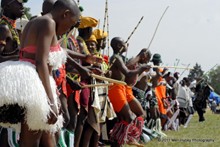Your goals in one place, not all over the place
You are not currently logged in.
If you don't have an account you can create one free and start making your list today!
ABOUT LESOTHO
Lesotho, officially the Kingdom of Lesotho, is a landlocked country and enclave—entirely surrounded by the Republic of South Africa. It is just over 30,000 km (11,583 sq mi) in size with a population of approximately 2,067,000. Its capital and largest city is Maseru. Lesotho is a member of the Commonwealth of Nations. The name "Lesotho" translates roughly into "the land of the people who speak Sesotho". About 40% of the population live below the international poverty line of US$1.25 a day.
Popular Goals
Morija Arts & Cultural Festival, also known as Morija Festival, is an annual event held in Morija, a large village in the Maseru District of Lesotho. This hugely successful event is coordinated by the Morija Museum & Archives, with support from many groups including, the Royal Family and the Government of Lesotho.
Maseru, the capital city of Lesotho, offers a unique blend of traditional Basotho culture and modern urban life. Visitors can explore the historic Thaba Bosiu, a significant cultural and historical site, or enjoy the lively atmosphere of the local markets where artisans sell traditional crafts. The city provides a gateway to the stunning landscapes of the Maloti Mountains, ideal for hiking and outdoor adventures. Additionally, the National Museum offers insights into the country's rich heritage, making Maseru a fascinating destination for those interested in both history and natural beauty.
Molimo-Nthuse is a town in western Lesotho. It stands close to the western approach to the God Help Me Pass, on the banks of the Makhaleng River.
Festivals and Events
Other Goals
Cities



